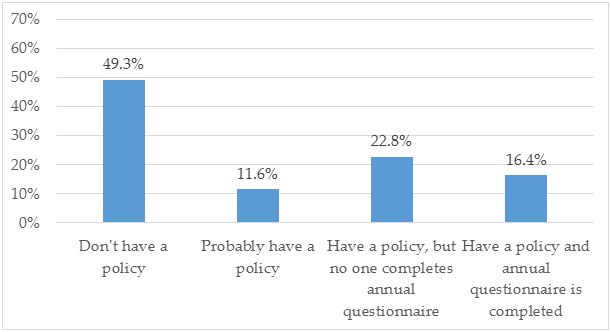Most churches are ill-equipped to handle conflicts of interest. This is one of the most compelling findings from a national survey of church governance practices conducted by the Evangelical Council for Financial Accountability (ECFA).
When asked to describe their governing board’s conflict-of-interest oversight, nearly half (49%) of churches said they do not have a conflict-of-interest policy. One in ten churches (12%) indicated they “probably” have a conflict-of-interest policy but that the board has not reviewed it for a long time.
Only about one in six churches (16%) said they have a conflict-of-interest policy, refer to it when needed, and require the board and key staff members to annually complete a conflict of interest questionnaire related to the policy.

The importance of properly handling conflicts of interest
So, what’s the big deal? Why is it critical for a church to properly handle conflicts of interest?
To answer these questions, we must start with a more basic question: What is a “conflict of interest” in the context of church administration?
There is potential for a conflict of interest when a person who is responsible for promoting the best interests of the church has a competing personal interest.
In other words, individuals in positions of influence at a church, such as board members and key leaders who are responsible for conducting and overseeing the church’s business affairs, may occasionally find their personal interests competing with their duty to make decisions in the best interest of the church.
Consider two practical scenarios:
Example 1. First Church needs to hire additional personnel to keep pace with its growth. The board of First Church is responsible for hiring new ministry staff members. A spouse of one of the board members is being considered for a job opening.
The board member has an apparent conflict of interest between making a hiring decision in the church’s best interest and promoting a personal interest (the hiring of the board member’s spouse).
Example 2. First Church is looking for insurance coverage. One of its board members is an insurance broker who has submitted a proposal to provide insurance for the church.
The board member has an apparent conflict of interest between making a business decision in the church’s best interest and promoting a personal interest (the selection of the board member’s insurance company).
Within this context, the importance of handling conflicts of interest with integrity becomes clear for at least two major reasons:
- Conflicts of interest can pose threats to church leaders maintaining their biblical duty of stewardship and legal duty of loyalty to the organization. (For further discussion about the legal duty of loyalty and other fiduciary duties, see “Four Fiduciary Duties of Church Boards” by Richard Hammar.)
- Even when leaders are able to overcome these potential threats in reality, often the simple appearance of a conflict of interest may be enough to impair trust in the church if not handled appropriately. “Conflicts of interest are messy and make for sensational news. When this happens, the conflicts of interest are the attention-point instead of the wonderful work your church is accomplishing with God’s help,” ECFA president emeritus Dan Busby says.
The solution
It is impossible to isolate a church from all potential conflicts of interest (certainly as long as people are leading ministries). Preventing all conflicts of interest should not be the goal. In fact, in certain cases, a transaction between the church and someone with a potential conflict of interest may actually achieve the church’s best interests, financially and otherwise.
The critical point for churches is to ensure they have the appropriate procedures in place—in the form of a board-approved conflict-of-interest policy—to handle these situations with excellence and integrity when they occur.
While conflict-of-interest policies should be tailored to meet the specific needs of each church, all sound policies should do the following:
-
- Define conflicts of interest and explain their importance, as well as the purpose of the church’s policy;
- Provide instructions for board members and key staff to follow when disclosing real and perceived conflicts (the what, when, where, how, and so on, of disclosure); and
- Provide instructions for how the governing body should proceed after receiving notice of a potential conflict (how the disclosure affects board discussion and voting, recording of meeting minutes, when individuals with conflicts should be recused from meetings, and so on).
In addition, conflict-of-interest policies should be accompanied by an annual disclosure statement or questionnaire, which periodically reminds leaders of the policy’s existence and the need to make any required disclosures. (Sample conflict-of-interest policies and annual disclosure statements are available in the ECFA Church Knowledge Center.)
After adopting a sound policy, remember to follow these four steps in your church when situations arise involving a potential conflict of interest:
Step 1: Exclude. All parties with a conflict of interest (direct or indirect) should be excluded from the discussion and the vote related to approving the transaction.
Step 2: Compare. Obtain reliable comparability information regarding the terms of the transaction from appropriate independent sources, such as competitive bids, independent appraisals, or independent expert opinions.
Step 3: Determine. The board should determine that the transaction is in the best interests of the church, including determining whether the transaction could be misperceived by givers, constituents, or the public—since the transaction in many cases may be publicly disclosed.
Step 4: Document. Contemporaneously document Steps 1, 2, and 3.
A way to demonstrate excellence and integrity
Conflicts of interest in church administration are unavoidable. If not handled appropriately, they can cause significant harm. Adopting and following a sound conflict of interest policy can help a church demonstrate excellence and integrity and, in turn, strengthen its witness for the gospel.





